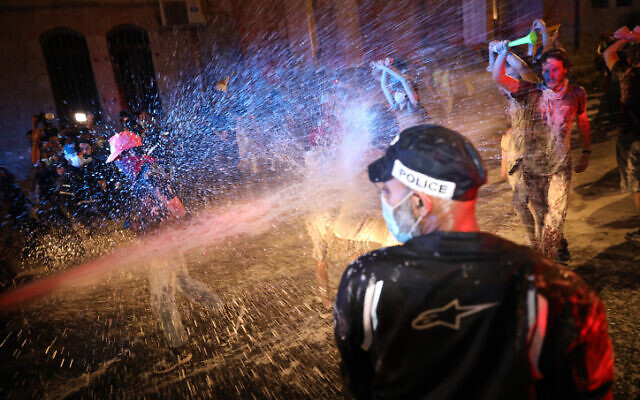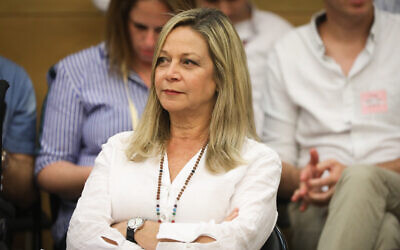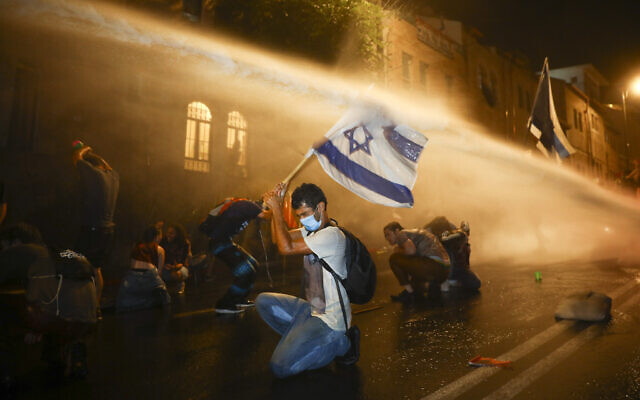Committee chair rebukes police for not sending a representative involved in the practice; demonstrators to picket police minister’s home Tuesday evening

A Knesset committee convened Tuesday to discuss police use of water cannons against protesters, after several instances in which officers have been accused of indiscriminate use of them during demonstrations outside the Prime Minister’s Residence in Jerusalem.
During the Internal Affairs and Environment Committee hearing, the panel’s chairwoman, MK Miki Haimovich, rebuked police for not sending a representative involved in the use of the cannons, which spray a high-intensity blast of water at protesters, knocking them over.
“This is unacceptable to me. When a Knesset committee asks police of the most senior rank to come here after problematic events like this, I ask that they come here. This is the Knesset and you need to respect us,” said Haimovich, a member of the Blue and White party.

While use of the cannons against ultra-Orthodox and others have been common for years, they have only gained attention in recent days thanks to intense media coverage of protests calling for Prime Minister Benjamin Netanyahu’s resignation.
“The images from the protest are not easy to accept. The right to protest is important, even if it’s inconvenient for neighborhood residents or the regime,” Haimovich said, according to the Ynet news site. “We need to correct the injustices done in protests in the past and they cannot be a guide for how to act in the present.”
MK Yitzhak Pindros of the ultra-Orthodox United Torah Judaism party was dismissive of the current focus on police use of water cannons during protests.
“There is dissembling that suddenly water cannons are used in the State of Israel. I’ve been familiar water cannons for decades already,” he said during the meeting.
A protester who was filmed being hit in the face by a water burst said it caused him to lose consciousness.
“I think they want to intimidate us from returning and protesting,” Yonatan Kimmel told the committee.
Sigal Bar Tzi, the police representative, defended the use of the water cannons, saying they were used in many countries as a non-lethal riot control tool.
“This only happens after endless dialogue and warnings,” she said.
לכל מי שתהו איך קרה שהאנשים ששכבו בצידי המדרכות התעלפו מהמכתזית – הנה התשובה: pic.twitter.com/GODAWYLvGO
— Achiya Schatz (@schatzah) July 24, 2020
The committee hearing came after protest organizers said over the weekend they would petition the High Court of Justice unless law enforcement officials refrain from using water cannons to disperse demonstrators.
Anti-Netanyahu protesters have for weeks been holding regular rallies outside his official residence on Jerusalem’s Balfour Street, calling on the premier to resign due to his indictment on corruption charges. They have been joined in recent days by people protesting Netanyahu’s economic policies during the coronavirus pandemic.
There have been occasional scenes of violence at recent protests, and police were reportedly wary of further clashes. Protesters have also accused police of using excessive force during the demonstrations.
Netanyahu and some of his supporters have spoken out against the protesters as “anarchists.”

Amnesty International has in the past highlighted the use of water cannons by law enforcement as posing a danger to demonstrators around the globe, most recently in Hong Kong. In 2015, an activist in South Korea died from injuries sustained when a water cannon was fired at him from close range.

On Tuesday evening, protesters were set to demonstrate outside the home of Public Security Minister Amir Ohana after he was recorded pressuring police brass to step up enforcement against demonstrators.
Responding to the recordings, which were aired Sunday evening by the Kan public broadcaster, members of the Black Flag movement said they “exposed the plot by the Netanyahu family’s police minister to block the citizen protest.”
According to a Channel 13 report, the protest organizers also demanded that the attorney general void all fines handed out to protesters, after Jerusalem’s police chief was heard in the recording saying police had stepped up citations against protesters for not wearing masks properly.
According to the leaked recordings aired Sunday, Ohana is seeking to “challenge” a High Court ruling that allowed the continued protests in Jerusalem against Netanyahu, and is applying immense pressure on police to step up enforcement against demonstrators.
Ohana, who lives in a Tel Aviv high-rise, has previously been reported to be pushing for the Jerusalem demonstrations to either be banned or relocated away from their usual site outside Netanyahu’s official residence.
Ohana has claimed several times in recent days that the protests are part of a trend of “incitement” against Netanyahu that he says is worse than the lead-up to the 1995 assassination of prime minister Yitzhak Rabin.
He has also raised concerns that the demonstrations, which have been held almost nightly in Jerusalem over the past week, are a danger due to the spread of the coronavirus and noted that other types of public gatherings have been banned to prevent the virus spread.
As reported by The Times of Israel
